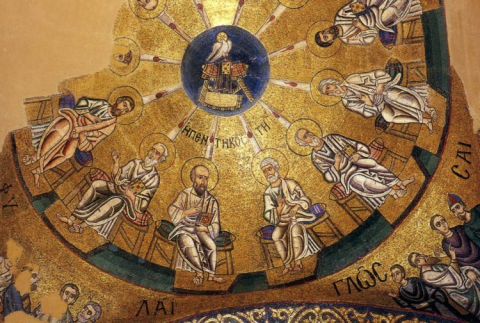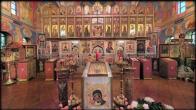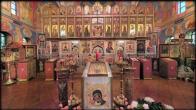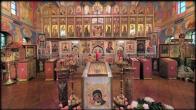You are here
PENTECOST

Priest Sergei Gankovsky
“COME AND DWELL IN US”
“Come and dwell in us”! Beginning today, we will again and again raise up our prayers to the Holy Spirit, the Comforter, in hopes that on our sorrowful earthly journey, we will receive – as did the Apostles, our ancestors in the Church - protection and support, reward and comfort, all those things that for us weak ones, for us who are weak in faith, are essential. Just from the way we sang that marvelous prayer to God the Holy Spirit, with what anticipation and hope we all spoke the words of that appeal, even a novice could see that the people of God are thirsting after spirituality, are looking to the Spirit for consolation and calm. It is no coincidence that our Lord Jesus Christ called the Third Person of the Holy Trinity the Comforter, i.e. the One Who fills and completes the human soul in such a way that with Him sorrow is not sorrow, and misfortune not misfortune. For when the soul is filled with this joy, with this fullness, this consolation, nothing can trouble, offend, or sadden it, as the Gifts of the Holy Spirit are “love, joy, peace, longsuffering, gentleness, goodness, faith, meekness, temperance ” (Galatians 5. 22: 23).
Spirituality is in fact the gifts of the Holy Spirit of which the Apostle Paul writes in his Epistle to the “foolish Galatians” (Galatians 3: 1). Although we are living two thousand years after these people addressed by Paul, so stubborn in their goings astray, lived, we often exceed them in foolishness, especially in the matter of spirituality, the gifts of the Holy Spirit, which we never tire of invoking in our daily prayers.
More often than not, it seems to us that spirituality is what makes our soul tremble, what causes us to beat our breast more frequently, what draws cascades of tears from our eyes – in short, everything that has an effect on our sensory organs and on the emotional side of our being. In their religious life, those who in fact believe that sensory experiences are the result of the Holy Spirit’s action upon man, seek first and foremost experiences that agitate or bring joy to the soul. To such people it is important that the faces on icons be both tender and beautiful - as we understand the term i.e. with rosy cheeks and blue eyes. They need to have liturgical chant remind them of a lullaby that mommy sang them long, long ago. They need the things batiushka says to them to be simple and clear, not requiring agonizing meditation, and they need those things said in the tone of voice ordinarily used with small children or the grievously ill.
People who are not well schooled in church life generally think that reading great literature, going to exhibition halls, and best of all, listening to the finest examples of classical music is precisely what imparts the exalted gifts of the spirit to them, that makes them “spiritual” in the fullest sense of the word.
(…) Some Christians have arrived at the conviction that the grace of the Holy Spirit may be acquired not here and now, but only in distant grace-filled places: in the Holy Land, in distant monasteries, and during pilgrimages.
Obviously, in all three cases, two words “dukhovnost’’ (spirituality) and “dushevnost’” (operating with an animal soul, sensorily, by the laws of nature) are being confused; in Russian they sound alike, but they have completely different meanings. Of course, people forget that “dushevnost’” – is a characteristic of a fallen being, while “dukhovnost’” is the result of the grace-filled gifts of the Holy Spirit, and is the domain of the saints. Just as, after our forefathers fell into sin, our body changed, becoming sick, suffering, and mortal, so our soul, intimately tied to our body, was struck by sin. Along with it, all of our senses, all of our perceptions of experience became deceptive and unreliable. For our senses are of this world, while the Spirit of God is not. Thus, what is pleasing and delightful to fallen human nature can hardly be considered the fruit of ‘dukhovnost,’’ true spirituality.
In and of themselves, literature, representational art, and music are neither salvific nor ruinous. In a sense, art is like an iron, with which you can iron a cassock, or which you can throw at an enemy’s head. But it would be hard to expect that art, the product of the actions of fallen man, even one who is unquestionably talented, can become in and of itself a means to salvation. In its two-thousand-year history, the Church has not encountered a single instance of it being so.
As to “becoming spiritual” by making pilgrimages, one of our contemporaries, Venerable St. Sebastian of Karaganda, would always respond to requests by his spiritual children for permission to make a pilgrimage to a distant monastery by pointing around himself and saying “Here is your Lavra, here is Pochaev, here is Optina.” For in response to the question ‘And who is my neighbor?’ (Luke 10: 29), the Lord sends you not someone who is thirty-nine countries away, but one who is in fact right next to you. Therefore, if you want to become an athlete, carry around heavy weights, but if your goal is to acquire the Holy Spirit, be directed by the Apostle Paul’s words from that same Epistle to the Galatians: “Bear ye one another’s burdens, and so fulfill the law of Christ.” (Galatians 6: 2). This is why “inspiration to tremble with joy in tender rapture over the creation of works” is not at all a sign of or manifestation of spirituality; that [manifestation would be] the ability to forgive one’s foe, to endure injustice, and to refrain from being abusive.
When we repeatedly ask God to “come and dwell in us,” let us remember what we want, what we are asking, and in what we hope.
Amen.
PARISH LIFE
RECENT VIDEOS
Address of our Cathedral
Subscribe to our mailing list
While all the materials on this site are copyrighted, you may use them freely as long as you treat them
with respect and provide attribution on the Russian Orthodox Cathedral of St.John the Baptist of Washington DC.









